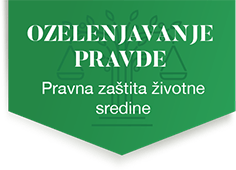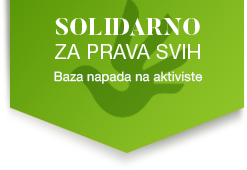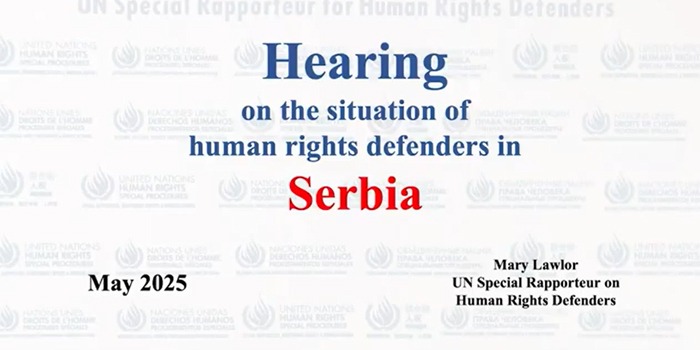In May, I had an eye-opening online meeting with eight human rights defenders from different human rights organisations in Serbia. I was greatly disturbed by the allegations I heard. The defenders told me that over the past year, the environment for HRDs has sharply deteriorated, marked by escalating repression, legal harassment, and systemic hostility from state authorities. They said the period since July 2024 has seen a dramatic intensification of threats, targeting not only established civil society organizations and activists but also students, academics, children, and foreign nationals engaged in human rights work.
They outlined to me the main trends relating to HRDs and civil society space in the country.
Escalating state repression and judicial harassment
They said the government has increasingly used the legal system as a tool of repression. HRDs have been arbitrarily detained at borders, subjected to unwarranted raids, and charged under vague and severe criminal provisions such as sedition and offences against state security. They said that peaceful protests, especially those related to environmental concerns and government accountability, have been criminalised, with mass arrests and pre-trial detentions. Legal aid teams are overwhelmed, and domestic remedies have proven insufficient, prompting NGOs to seek international protection.
Surveillance, digital Intrusion and privacy violations
According to the HRDs, there is widespread evidence of illegal digital surveillance against defenders, journalists, and activists. State security agencies have seized and compromised phones, extracted sensitive data, and deployed sophisticated spyware such as the so-called “Novi spy” and Pegasus. These actions violate Serbian law and international standards, yet independent oversight bodies have been reluctant to investigate. Attempts by civil society to seek accountability have so far yielded no results.
Smear campaigns, media attacks and data leaks
Participants told me that pro-government media have intensified smear campaigns against HRDs, broadcasting unlawfully obtained personal and financial information to discredit and intimidate them. They said that the “foreign agent” narrative is being weaponised to stigmatize NGOs and activists, with senior officials leaking sensitive donor and internal information seized during warrantless raids. This campaign extends to child rights organizations and academic staff, who are portrayed as traitors or agents of foreign interests.
Suppression of academic freedom and economic retaliation
I heard how universities and schools have become new frontlines in the struggle for human rights. Professors and teachers supporting student protests have reportedly faced systematic defamation, fabricated criminal charges, and severe economic reprisals, including drastic salary reductions. They said that the government has also pressured school administrations to suspend salaries of teachers involved in protests, often without due process or avenues for appeal.
Intimidation and violence against protesters
The described how mass protests, especially those following the Novi Sad tragedy, have been met with heavy-handed police tactics, including the use of arbitrary detentions and physical violence. They told me that students, children, and their supporters have faced intimidation, surveillance, and even knife attacks allegedly linked to ruling party affiliates. They said the climate of impunity is reinforced by law enforcement’s reluctance to investigate or protect HRDs.
Political persecution and targeting of youth and foreigners
The defenders emphasised that young activists and foreign nationals, particularly Croatians, have been singled out for political prosecution and harassment. Examples include illegal detentions, expulsion, and public disclosure of personal data. They said that the government has used historic grievances and nationalism to justify these actions, reducing shrinking civic space and deterring cross-border solidarity.
Erosion of rule of law and democratic institutions
One of their conclusions of all the above was that the government’s alleged abuse of power has undermined trust in public institutions. They argued that law enforcement and intelligence agencies have been politicised, with loyalty to the ruling party prioritised over professionalism. They described oversight mechanisms as weak or inactive, and stated that the judiciary is used to intimidate dissenters rather than protect rights.
The defenders concluded by saying that Serbian NGOs and HRDs are increasingly appealing to international bodies for intervention. They urged the international community to:
- Report on the misuse of legal frameworks against HRDs
- Investigate the use of crowd control tools and illegal surveillance
- Demand an end to smear campaigns and data leaks
- Call for the release of detained activists and students
- Recommend the establishment of a national protection mechanism for HRDs, in line with the UN Declaration
- Support judicial oversight and legal aid services
I have taken on board these recommendations and will be keeping them in mind in my future interactions with the government of Serbia and other international and regional human rights mechanisms. I wish to sincerely thank the HRDs who agreed to meet with me and share their assessment of the current landscape for defenders in Serbia.





